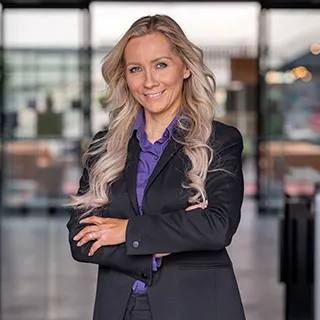Claire Clark
Where it all started
Claire has always had an interest in how things work, and how to make our lives better. What sparked her curiosity for engineering was found in the comfort of her own home, her computer. She was fascinated by computer programs and software and how this allowed her to connect with people.
“I just wanted to learn more about software and IT as well as be someone who helped to make a difference in this space.”
With the evolution of software and the endless learning opportunities, Claire recognised that this was the field she desired to explore.

During university, she received a Bachelor’s with Honors in Computer Science with Information Engineering. This marked the start of her journey towards becoming an engineer.
Claire holds herself to a high standard, not only for her expectations but also for the benefit of her colleagues. Claire knew she wanted a Professional Registration title, as within her industry, the significance of becoming a Chartered Engineer (CEng) was widely acknowledged. Within her industry, the significance of a Chartered Engineer (CEng) title is widely acknowledged.
“I wanted to become a Chartered Engineer with the Institute of Engineering and Technology, so that I could be independently benchmarked to the highest-level”
Building an application
Before Claire could apply for a Professional Registration title, she needed to become a member of the IET.
“I wanted my skills, experience, competencies, and achievements to be independently benchmarked to the high standard of the highly regarded institution that the IET is.”
At the start of her application, Claire began collating all her evidence. This included copies of her certificates for courses and learning activities, as well as all of her career achievements to date. She obtained references including a nomination from an existing Chartered Engineer who had worked with her and could vouch for her professional achievements.
With her evidence collated and ready to add to her CEng application, she spoke with the IET, who then matched her with a mentor. He helped her understand all the competencies she would be assessed against and provided guidance on what to do next.
“I feel this help made a significant difference in making my application process feel easier for me to understand.”
Claire used the IET’s online tool, Career Manager to complete her application, making it a breeze to fill out the application and put all her evidence in the correct locations.
“It’s easy to use and a great way to help you track and reflect on learning activities.”
With her application submitted, Claire soon received an interview date, where they took a deep dive into her application. During the interview, she discussed her responsibilities and the decision-making processes associated with the projects she had undertaken. A few months later after the interview, Claire was awarded with her CEng, marking a significant milestone in her professional journey. Since then, she has sustained her momentum, consistently progressing in her career.
“I was incredibly proud to receive confirmation that I was now a Chartered Engineer.”
Success with CEng
Since being awarded her CEng title, Claire feels that the title has provided her with the credibility she deserves based on her career and past achievements.
“There are not many women in Engineering roles, and not many that have held senior roles like I have, so to be of a minority and a Chartered Engineer, I feel that it also helps me to be a positive role model.”
Claire looks for areas in which she can improve and expand her knowledge and skillset. Her commitment to maintaining her CEng means she is constantly ready to learn new things and continues to work at a high and professional level.
After setting up her own business, Claire now looks to learn more about the non-engineering side of running a business to enrich her professional career. She looks to encourage and guide her colleagues
“It’s been a great start to my business, I’ve received amazing feedback from those whom I have helped”
Advice
- Contact a Mentor – “Make sure from the start you get in touch with your designated IET member who will help guide you through the process.”
- Focus on your Professional Development – “There is a lot you can learn about which areas of your personal development you should consider focusing on.”
- Utilise Career Manager – “I use the IET’s Career Manager platform regularly to track and update my learning activities and Personal Development Plans.”
Thanks for your patience. We’ve upgraded our systems, all part of our big picture plan to deliver a great experience for you.
Your log-in access has been reinstated for our websites and systems but should you encounter any issues, our Member Relations team is here to support you on +44 (0)1438 765678 or via membership@theiet.org.
